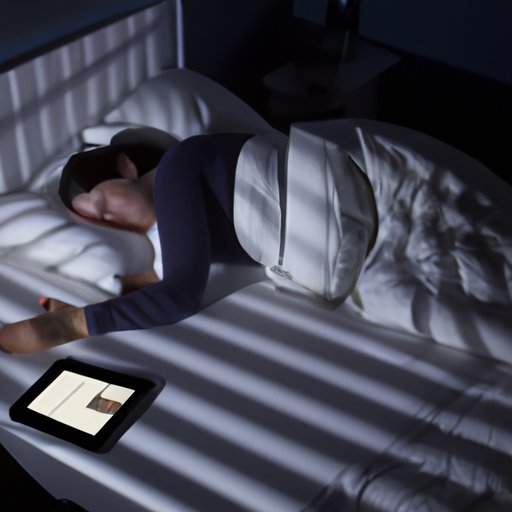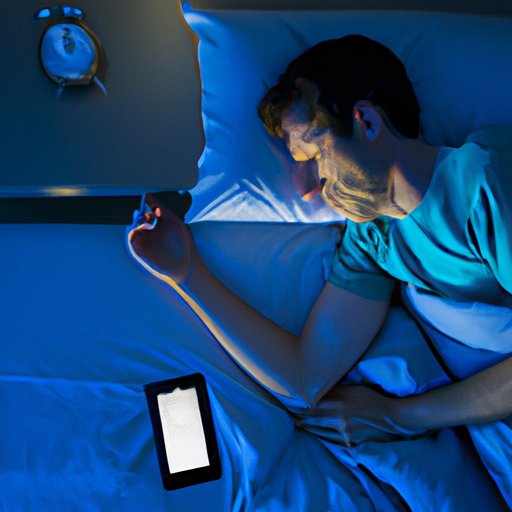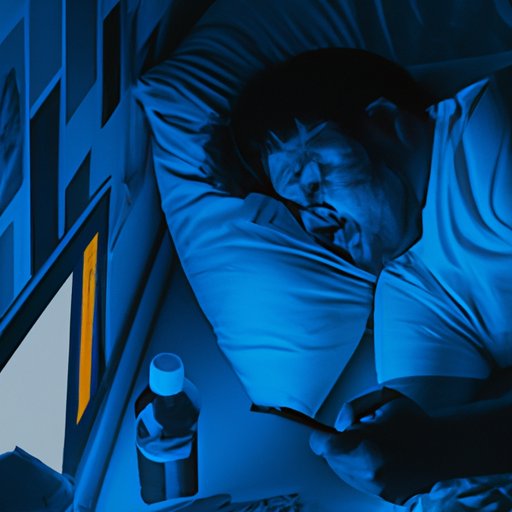Introduction
Technology is defined as any application or device that uses scientific knowledge to solve problems. It has become an integral part of our lives, from smartphones to computers, and its use is widespread throughout the world. But as much as technology can improve our lives, it can also have a detrimental effect on our sleep patterns.
In this article, we’ll explore how technology affects sleep, examining the impact of technology on sleep patterns and the negative effects of technology on sleep quality. We’ll also look at solutions for reducing the impact of technology on sleep and provide a reflection on how technology impacts sleep.

Examining the Impact of Technology on Sleep Patterns
The relationship between technology and sleep is complex, and the impact of technology on sleep patterns varies from person to person. However, there is evidence to suggest that technology does indeed have a negative effect on sleep.
How Screens and Technology are Interfering with Quality Sleep
A study conducted by the National Sleep Foundation found that 95% of Americans use some type of technology within an hour of going to bed. This includes watching television, using their phones, playing video games, and browsing the internet. These activities can make it difficult for people to fall asleep, as the blue light emitted from these devices can interfere with the body’s natural production of melatonin, a hormone that helps regulate sleep cycles.
According to Dr. Charles Czeisler, chief of the Division of Sleep Medicine at Harvard Medical School, “Our bodies are designed to be awake during the day and asleep at night, but the increasing use of electronic devices in the evening is having a significant and concerning impact on our sleep.”
Understanding the Connection between Technology and Insomnia
In addition to interfering with the body’s natural production of melatonin, technology can also lead to insomnia, which is characterized by difficulty falling asleep or staying asleep. According to a survey conducted by the National Sleep Foundation, 63% of adults reported that their sleep was affected by technology at least a few nights a week.
When people use technology before bed, they often become so engrossed in what they are doing that they forget to go to bed or stay up later than they intended. This can lead to difficulty falling asleep and can disrupt normal sleep cycles.

The Negative Effects of Technology on Sleep Quality
The negative effects of technology on sleep quality can be far-reaching. Not getting enough sleep can lead to a variety of physical and mental health issues, such as fatigue, irritability, difficulty concentrating, and memory problems.
Exploring the Relationship between Technology Use and Sleep Deprivation
Sleep deprivation is a major problem in the United States, with more than one-third of adults not getting enough sleep on a regular basis. According to the Centers for Disease Control and Prevention (CDC), technology use is a major factor in sleep deprivation, as people may stay up late to use their phones or tablets or may be woken up during the night by notifications from their devices.
Studies have also shown that technology use is associated with increased levels of stress and anxiety, which can further interfere with sleep. For example, a study published in the journal Stress and Health found that people who used their phones for more than two hours a day were more likely to report feelings of stress and anxiety than those who used their phones for less than two hours a day.
Analyzing the Role Technology Plays in Disrupting Normal Sleep Cycles
Technology can also disrupt normal sleep cycles. A study published in the journal Sleep Medicine found that people who used their phones or tablets after 9pm experienced more fragmented sleep than those who did not use their phones or tablets after 9pm.
In addition, people who used their phones or tablets for more than one hour after 9pm experienced poorer sleep quality than those who used their phones or tablets for less than one hour after 9pm. This suggests that limiting exposure to technology after 9pm can help improve sleep quality and reduce the risk of sleep disruption.
Solutions to Reduce Impact of Technology on Sleep
Fortunately, there are a number of solutions for reducing the impact of technology on sleep. By making a few simple changes, you can improve your sleep quality and get the rest you need.
Limiting Exposure to Blue Light
One of the most effective solutions for reducing the impact of technology on sleep is to limit exposure to blue light. Blue light is the type of light emitted from electronic devices, such as phones and tablets, and can interfere with the body’s production of melatonin. To reduce blue light exposure, you can use blue light blocking glasses or install a blue light filter on your device.
Establishing Healthy Technology Habits
Another solution for reducing the impact of technology on sleep is to establish healthy technology habits. Try to limit your exposure to technology before bed and avoid using your phone or tablet in bed. Additionally, set a time limit for technology use and stick to it.
Creating a Bedtime Routine
Finally, creating a bedtime routine can help reduce the impact of technology on sleep. A bedtime routine can help signal to your body that it’s time to wind down and prepare for sleep. It should include activities that promote relaxation, such as reading a book, taking a bath, or listening to calming music. Avoiding technology at least an hour before bed can also help promote better sleep.
Conclusion
Technology can have a significant impact on sleep patterns, from interfering with the body’s natural production of melatonin to disrupting normal sleep cycles. Fortunately, there are a number of solutions for reducing the impact of technology on sleep, such as limiting exposure to blue light, establishing healthy technology habits, and creating a bedtime routine.
Reflection on How Technology Impacts Sleep
It’s important to recognize the role technology plays in our lives and the impact it can have on our sleep. By understanding the relationship between technology and sleep, we can make informed decisions about how we use technology and take steps to improve our sleep quality.
Summary of Solutions to Reduce Negative Effects of Technology on Sleep
To reduce the negative effects of technology on sleep, try to limit exposure to blue light, establish healthy technology habits, and create a bedtime routine. By following these steps, you can help ensure that you get the restful sleep you need.
(Note: Is this article not meeting your expectations? Do you have knowledge or insights to share? Unlock new opportunities and expand your reach by joining our authors team. Click Registration to join us and share your expertise with our readers.)
